Special government programs operating on the territory of the Russian Federation are aimed at providing citizens with housing if they are deprived of it due to the demolition of a residential apartment building.
Responsibility for such actions is assigned to local authorities and they are carried out at the expense of the federal budget. It is worth considering that to date the program has been extended only until the end of September 2017.
If the government's decision does not change and it is not extended, it will cease to operate.
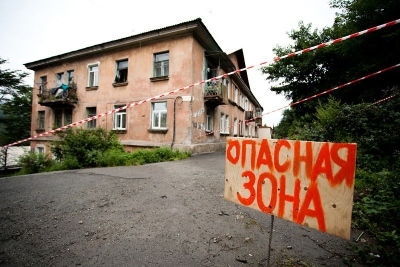
It is equally important to keep in mind that the period for consideration of the issue is influenced not only by the fact when the residents began active work, since all the main work is entrusted to the interdepartmental commission. The commission makes its decisions referring to the articles of the Housing Code of the Russian Federation.
Our articles talk about typical ways to resolve legal issues, but each case is unique. If you want to find out how to solve your specific problem, please contact the online consultant form on the right →
It's fast and free! Or call us by phone (24/7):
If you want to find out how to solve your particular problem, call us by phone. It's fast and free!
When is this possible?
The current norms of Russian legislation define a residential building as dilapidated when its supporting structure has worn out to a certain extent.
In percentage terms, a structure poses a threat to human health and life and the risk of collapse when it is worn out by more than seventy percent.
At the same time, residents cannot always count on receiving a new apartment, since in addition to demolition, the building may be reconstructed.
Before considering how apartments are given to owners when a house is demolished, it should be clearly understood that visual signs of disrepair, deformation and visible damage to the structure must be documented. The higher the danger to those living in the house, the sooner this needs to be done.
Reasons to declare a house unfit for habitation:
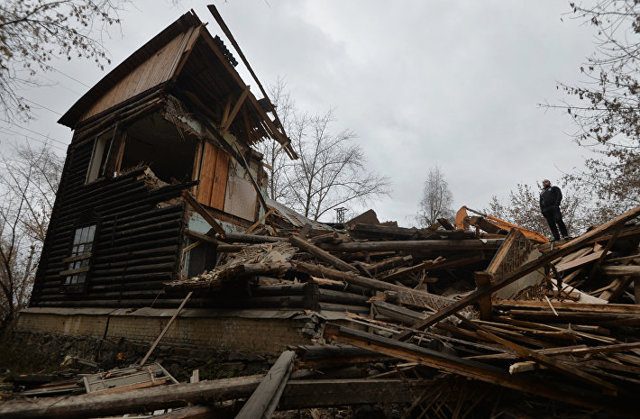 Availability of an official conclusion of the commission recognizing the building as unsafe, dilapidated or subject to demolition;
Availability of an official conclusion of the commission recognizing the building as unsafe, dilapidated or subject to demolition;- Location of real estate in industrial zones, on the territory of utility networks, outside sanitary and fire safety conditions;
- Location near the site of shale mines, rock dumps, landslides;
- Ecologically unfavorable situation;
- Impossibility of providing mandatory housing and communal services for technical reasons.
Interdepartmental commission and its role
In order to recognize the housing as subject to demolition and receive another apartment in its place, you first need to submit an application and a list of documents attached to it to the local government body.
The application must require an appropriate examination.
After considering the appeal, the administration appoints an interdepartmental commission whose task is to make a decision on the demolition of the building and resettle the residents in new apartments.
Not only the owner of the residential premises has the right to submit an application and documents independently. You can also submit a collective appeal. In addition, employers, tenants, federal authorities, management companies and government supervisory authorities can apply.

Residents' initiative
Every citizen living in a residential building that poses a threat to human health and life must understand that government agencies cannot simultaneously control every object.
Even for scheduled inspections there are schedules, and you shouldn’t expect the responsible services to show up at the behest of your sixth sense. When assessing the situation, residents of emergency buildings must take the initiative on their own by submitting appropriate applications.
Such requests are accompanied by:
 Passport of each applicant, if this is a collective application;
Passport of each applicant, if this is a collective application;- Title papers for housing in an apartment building (certified copies must be submitted, not originals);
- Technical and cadastral passports, plans;
- Acts of independent examinations, which record the discovery of destruction, deformation and other factors that give grounds to recognize the building as unsuitable for habitation.
Depending on the circumstances of each individual case, the specified list of documents may be supplemented. In addition, it is allowed to submit them along with the application not only during a personal visit, but also using the post office or the electronic portal of government services.
When will they resettle
After the interdepartmental commission makes a final decision that the house is subject to demolition, the act will be signed and handed over to the administration. Further, everything will depend on the local government. In other words, the commission’s role is only to examine the need to relocate residents, but it itself is not involved in this process.
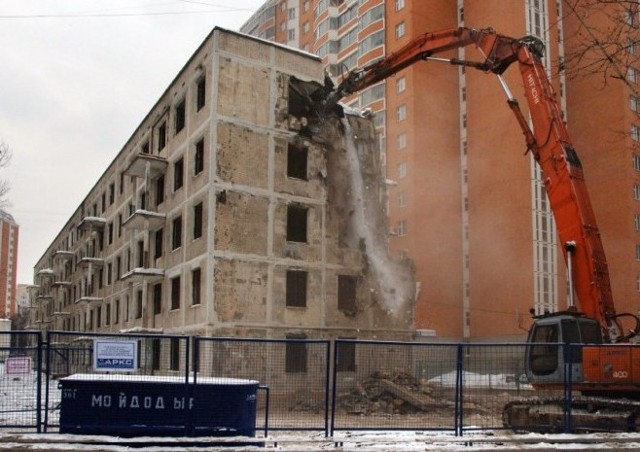
It is worth noting that in particularly dangerous situations, notifications are sent out on the same day when the order is signed. Accordingly, the relocation period is significantly reduced.
In accordance with the orders, of which there are actually many in the local administration, a queue of citizens for resettlement is drawn up. There are no time limits for this process and are not required by law to be clear. However, more than one year cannot be allotted for resettlement.
What in return
After completing all formal actions, that is, after considering the request, the inspection report by the commission, signing the order and sending out notifications, a completely logical question arises - what is the local government obliged to give to resettled citizens in return for their previous housing. In accordance with the norms of Russian legislation, resettled persons have the right to claim:
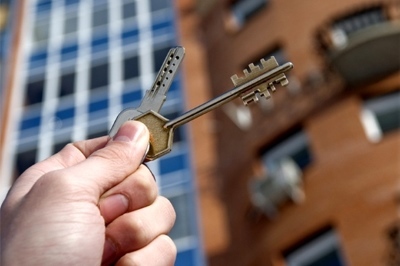 A living area equivalent in size to the one they had before. A privatized apartment in a building to be demolished will be replaced with an apartment of the same area, a municipal one will be replaced with housing at the rate of 18 square meters per person;
A living area equivalent in size to the one they had before. A privatized apartment in a building to be demolished will be replaced with an apartment of the same area, a municipal one will be replaced with housing at the rate of 18 square meters per person; - Location of new housing in the same locality. At the same time, individual wishes and requests for relocation to another city are not considered;
- A fully habitable premises with utilities (electricity, water supply, heating, gas, drainage);
- A facility that complies with sanitation and fire safety standards.
Local authorities will give citizens a choice of three options on a first-come, first-served basis. That is, they will offer one, if it doesn’t suit, they will offer a second, and so on. From these three, you can choose the optimal housing. However, it is worth remembering that after refusal for the third time, the state deprives the person of the right to receive other housing, in exchange for the one remaining in the house for demolition.
How the process works
Having received official notice of the demolition of a house, each owner or tenant of housing, if it is municipal, must independently appear at the housing department of the local government. There, on the spot, it is necessary to reach agreement on further actions, as well as conclude an agreement on the seizure of the current apartment.
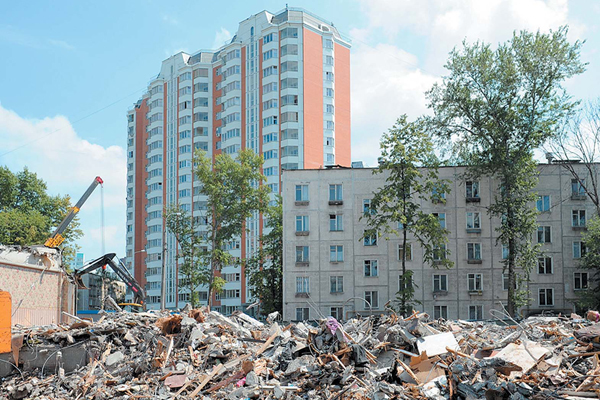
Alternative by law
If the house is declared subject to demolition and the apartment is privatized, you must refer to your rights to the Civil Code of the Russian Federation. According to him, home owners, after their privatization is formalized, have nothing to worry about. Despite the fact that they will be worried about choosing a new apartment and moving, they cannot be evicted anywhere and without compensation by law.

In other words, a person who has received notification that his house will be demolished and a privatized apartment will be seized can count on either a similar apartment or compensation in cash. Of course, in the second case, the costs incurred in connection with the eviction will also be taken into account.
In some regions of the country, people are immediately offered money instead of housing, since the waiting list for housing is long, and the municipal housing stock does not have the required number of apartments.
It is also important to keep in mind that the amount of compensation offered will be lower than the market price, so it is not always possible to purchase similar housing for this amount.
In such situations, you can again go to court.
After agreement
If you prefer monetary compensation in exchange for new living space, you should expect the local authorities to offer you three options to choose from. This must be real estate primarily in the same residential area as before, but it can also be in another, within the same locality. They have no right to offer an apartment in another city, and even without the consent of the citizen.
When apartment buildings are demolished, they usually issue housing from the secondary market. When agreeing and signing an agreement, you can stipulate the conditions according to which the local administration will issue a new apartment, but the individual will have to pay extra for its cost.
The new apartment is transferred in the form of a purchase and sale transaction, after which an agreement on the withdrawal of the previous property must be signed. A person will be obliged to vacate the previous apartment after receiving a new one within the time period specified in the contract. Often one month is provided for this. The responsibility for resettlement rests entirely with the local administration.
With each owner moving from a house for demolition, it is agreed upon in which area he will receive housing, of what size, with how many rooms and for what period. Once a suitable option is provided, the individual will be issued a warrant to inspect the apartment.
If housing is not privatized
Considering the situation where an apartment in a building for demolition was not privatized, and a person lived in it under a social tenancy agreement, one can count on the provision of another housing under a social tenancy agreement. Regardless of the area of housing in the demolished building, the area of the new one will be calculated at 18 square meters per resident.
These social norms are aimed at improving living conditions. However, after changes were made to the privatization law, new norms are actively used. According to them, tenants, as well as owners, can count on equal compensation in terms of area and number of rooms.
However, there are no guarantees that citizens will remain living in the same area where they lived before.
Based on the above, it can be noted that the direct benefits from privatization are no longer relevant.
This means that it makes more sense to privatize not the apartment that is located in the building intended for demolition, but the one that will be provided under a social rental agreement in exchange.
In this case, its cost and living conditions will be higher. Having privatized an old apartment, counting on monetary compensation, you can find yourself in an even more disadvantageous position.
How are apartments given to owners when a house is demolished and what do owners get in return, what area, conditions
Home / Housing disputes / Emergency housing / How apartments are given to owners when a house is demolished and what they get
Views 75

Old, dilapidated "Khrushchev" buildings pose a danger to the owners living there. From year to year, the lists of houses are replenished with new objects. The authorities’ task is to recognize such housing as unsafe, include it on the demolition list and move the residents to new apartments.
For those whose home is recognized as unsafe, the question arises: what will they receive in return and can they count on benefits? In theory everything is simple, but in reality difficulties arise.
Often the authorities break their promises and offer owners apartments that are unfit for habitation.
Is it possible to influence the choice of what kind of apartment they will give, how much space it is, and where to complain if the conditions are violated? All the details are in our article.
What do owners receive when moving out of emergency housing and under what conditions?
The obvious reason for the demolition of a house is its disrepair. We are talking about high-rise buildings that pose a danger to residents. The degree of wear can range from 70 to 90%, and in some cases even higher. For comparison, people are not being resettled from dilapidated housing. If experts recognize that the house needs to be demolished, the administration includes the object on the emergency list.
Apartment residents will wait until their turn to be rehoused . At the same time, the authorities are obliged to provide proportionate compensation in return - by virtue of Art. 32 Housing Code of the Russian Federation.
Having received a notification about the resettlement of an emergency “Khrushchev” building, the owners can choose what they will be given in return. We will look at the available options below.
Equivalent Housing
The most popular option is equivalent or equivalent in cost residential premises. This is what many owners of uninhabitable properties choose.
Features of providing new equivalent housing:
- Owners of an apartment in a dilapidated building will be able to claim a residential space of equal size in a new high-rise building, for example, a 2-room apartment with an area of 45 m².
- moving to an equivalent apartment, i.e. in housing of the same cost as an apartment in a dilapidated building - a rare option;
- allocation of housing in the same area, or, in extreme cases, a populated area;
- new comfortable living space with all amenities: electricity, gas, hot and cold water supply, heating, etc.
- transfer of shared ownership to a new living space, preserving the shares of the owners;
- compliance with SanPiN standards.
The total area of the apartment includes residential and non-residential space, for example, living rooms, footage of the corridor, bathroom, toilet, kitchen, pantry, loggia or balcony. Unauthorized extensions and unauthorized redevelopment are not taken into account.
Based on practice, people are offered equivalent housing, often with larger square footage than the old one (for example, 36 m² instead of 33 m²). However, some categories of citizens may qualify for increased living space and improved living conditions in a new home. To do this, they must be recognized as in need of improved housing conditions, i.e. stand in line for new housing.
Example:
The Sabitovs owned a 1-room Khrushchev apartment in a dilapidated house. The housing was old, with shabby walls, creaking floors and leaking roofs. Their house was included in the city's list of emergency facilities, and a date for resettlement was set.
The city property department offered to move into a new comfortable apartment. Since the authorities offered equivalent housing, they requested data on the estimated value. The new apartment turned out to be more expensive than the one in which the Sabitovs lived. They were offered to pay extra for the difference in price.
At the same time, the administration provided a 10% discount.
Redemption price (compensation)
For some owners of damaged housing, it is more profitable to receive monetary compensation. This happens if a person does not need a new apartment, but wants to be paid with money. For example, the owner rented out housing in a dilapidated building, but he himself lives in another place.
What is included in the purchase price and what you can expect:
- firstly , the market price of the lost living space + the cost of home ownership and land;
- secondly , losses and expenses for changing the place of residence (moving, rental of freight transport, realtor services, temporary rental of residential premises, expenses for registration of property rights);
- thirdly , lost profits, for example, from renting out housing to tenants, which was interrupted by a forced move from a dilapidated building (Clause 7, Article 32 of the Housing Code of the Russian Federation).
The apartment is assessed according to the lowest market indicators. Moreover, 20-40% will definitely be deducted from the final amount, since the housing is in disrepair .
It is difficult to say what will remain in the end. There are cases when people could not buy even the cheapest one-room apartment on the outskirts of the city - the redemption price turned out to be so low.
You definitely shouldn’t count on excess profits and benefits!
Example:
Three heirs inherited a 1-room apartment in a dilapidated building from a relative. The building had been in an unusable condition for a long time; almost no people lived in it - only grandparents remained. Soon it was the turn of the high-rise building to move out. The heirs, being shared owners of the apartment, received notices from the administration.
It was proposed to either move into a new apartment in a building under construction, or take money based on the assessment of the old living space. The heirs did not want to wait 1.5 years for a new house to be built, and there was no particular need for housing. The shareholders agreed that they would take it in money. The total cost of the redemption price was 1,200,000 rubles.
400,000 rubles were transferred to the account of each of the co-owners.
Features and nuances
The property regime plays an important role in the provision of new housing when an apartment building is demolished. Let's look at what the differences are.
If the apartment is privatized
The bottom line is that private property is protected by the state. If an apartment belongs to a person by right of ownership, the authorities cannot take it away. A choice is given: new housing or cash buyout (Article 32 of the Housing Code of the Russian Federation).
The owners will be informed in advance about where they will be moving - this can be either housing in a new building or an apartment on the secondary housing market . By default the area should be the same. However, they can offer another location - with the consent of the owners.
Know that it is unacceptable to move the owner into a municipal apartment and enter into a social tenancy agreement with him.
If the housing is not privatized
The choice is limited if citizens live in an apartment under a social rental agreement with the city administration. Non-privatized housing is listed on the balance sheet of the municipality. Therefore, according to Art. 86-87 of the Housing Code of the Russian Federation, the city administration terminates the social rental agreement with the tenant of such an apartment. At the same time, members of his family are being evicted from the dilapidated house.
Those being evicted are offered only one option - relocation to another municipal housing . There is no talk of any ransom.
Questions immediately arise regarding the area of the new apartment. For example, if the employer and his family were registered as needy. What to take as a basis: the accounting norm for one person is from 12 to 18 square meters. meters and/or “transfer” the previous footage to a new living space? Judging by practice, both cases occur - issues are resolved at the level of constituent entities of the Russian Federation. The law does not provide for an unambiguous interpretation.
A way out of the situation may be the privatization of emergency housing - but here you need to remember the difficulties and limitations.
The procedure for providing housing if the house is recognized as unsafe
After the house has been declared unsafe, you have to wait for occupancy. This will not happen immediately, but after a certain time - maybe a month, maybe a year.
How apartments are given to owners of a dilapidated building:
- Issuance of an act recognizing the house as unsafe and subject to demolition.
- Generating reporting that says: how many apartments are in a five-story building, the number of residents, a preferential list of citizens, the degree of deterioration, is it dangerous to live in the house right now, terms for the future, etc.
- Distribution of notifications to each of the owners.
- Owners of residential premises make a choice: moving to a new apartment or receiving monetary compensation.
- Inspection of residential premises in a new building - for those who intend to move to a new apartment.
- Notifying the authorities of the decision.
- Appraisal of the apartment - by a public or private company of experts.
- Drawing up a purchase and sale or exchange agreement - in the case of relocation to comfortable residential premises. Signing an agreement on the repossession of an apartment - in the case of a redemption price for a demolished building.
- Execution of agreements, for example - compensation is transferred to the bank account of the owners.
Features of the procedure in individual regions may change the current order. However, in most cases the instructions remain the same.
Applications and documents
Do I need to prepare separate documents?
In fact, no, but apartment owners will have to notify the city administration of the decision by sending:
- agreement to the redemption price - based on the market indicator;
- consent to move to comfortable living space in a new building.
A sample application can be found below, and based on it you can create your application:
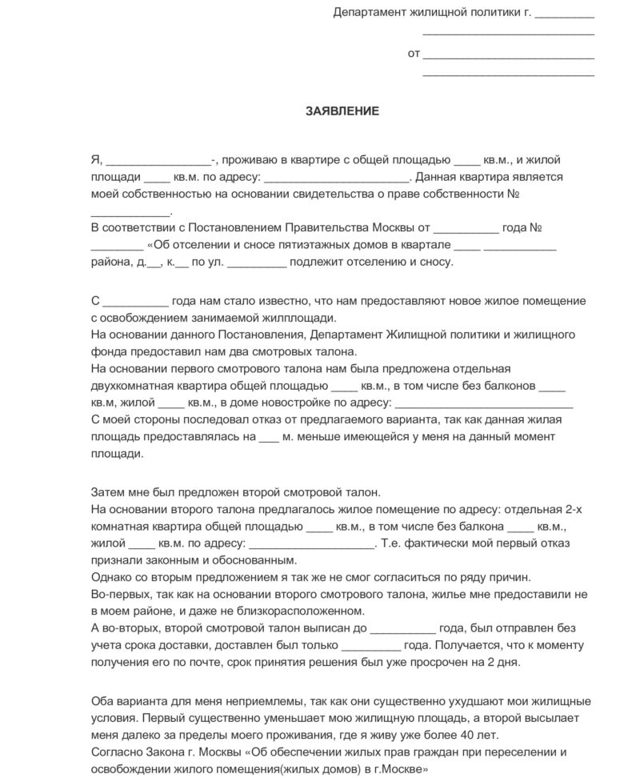


Relocation deadlines
Notifications from the authorities contain a specific deadline for the resettlement of the emergency house. Often it is only indicative. But you will still have to rely on it.
The city administration is obliged to notify residents no later than 1 year before the actual demolition of the house . In case of force majeure, when the house is on the verge of collapse, the deadlines are reduced. Residents of the building are urgently relocated to new housing within 1-2 days.
The period for considering the authorities’ proposal is 3 months from the date of receipt of the notification letter. It is not advisable to delay the answer. Good options are sold out quickly. And living in the old “Khrushchev” is not safe.
After the residents sign a purchase and sale agreement or an agreement to repossess the apartment, they are given 30 days to move . During this time, citizens must vacate their living quarters. As soon as all residents move out, the management company will disconnect communications in the house. Next, preparations for demolition of the building will begin.
What to do if the proposed housing is not satisfactory?
It is at the discretion of the owners to sign the agreement or refuse the options proposed by the authorities. It happens that residents are not satisfied with either the new apartment or the purchase price. Especially if municipal authorities offer very bad options. For example, a 1-room apartment instead of a 2-room apartment or an insignificant amount of compensation.
It is important to remember that the law is on the side of apartment owners. If a house is to be demolished, the authorities are obliged to provide equivalent housing in its place. Do not agree if you are persuaded to move to another city.
Exhortations such as “the city does not have housing in your neighborhood...” are unfounded. The task of the authorities is to comply with the law and the rights of owners. If you refuse, you can safely go to court.
Although, on the other hand, if the housing option is attractive, we can agree. First, it’s worth going to the address of the new house and inspecting the apartments from the inside. It also doesn’t hurt to read reviews about the area, infrastructure, ecology, etc.
Is it possible to refuse to move from a dilapidated house for demolition?
The main criterion for the accident rate of a house is wear and tear of structures. It happens that the building remains stable and you can live in it, but the authorities have declared the house unsafe. A conflict arises over the eviction of tenants.
If the owners refuse to move from a dilapidated building, the administration will offer different options three times For example, new apartments in different areas or an increase in monetary compensation. If all else fails, the city can sue . And only then, based on the court’s decision, bailiffs will intervene in the case. In fact, people will be asked to vacate their apartments by force (Article 107 of Federal Law No. 229 “On Enforcement Proceedings”). Of course, in the event that the house is really facing demolition and is ready to collapse.
An emergency condition may not affect the entire house, but only part of a multi-story building , for example, the upper tier, right or left wing.
Residents of a suitable part of the house for habitation have the right to refuse relocation. The building is undergoing restoration or major renovation.
Those whose apartments are located in the emergency part of a five-story building may be provided with temporary apartments (for example, in a hostel or from social housing).
Regions set their own standards for recognizing houses as unsafe. Some subjects of the Russian Federation practice relocating people to new homes. For others, it is more profitable to conclude an agreement on payment of compensation for demolition.
It is impossible to say exactly what the owners will be given in return for the seized apartments. It is necessary to assess the situation taking into account the specifics of the targeted program and the subtleties of local legislation. But we must remember that residents have the right to reasonable compensation.
If the authorities do not cooperate, the issue is resolved through the courts.
Relocation from emergency “Khrushchev” buildings always goes hand in hand with violations of the rights of residents. Often, out of despair, people are forced to agree to proposals from local authorities. For example, move to a new house on the outskirts of the city or to a nearby village. Other citizens are left without housing at all. Still others are paid pennies for the seized apartment.
The lawyers on our site will help you understand your situation, explain the rights of tenants, and determine how much space you can demand from the authorities. Together with a lawyer, you can defend your interests. There is no need to agree to the enslaving offers of the municipality. Residents are entitled to comfortable housing with all amenities. We will help you achieve it!
Look at the pressing problems with the provision of new housing in new buildings:
Residential building for demolition: what guarantees exist for homeowners
Legal advice > Civil law > How are apartments given when a house is demolished? What can you expect?
At the state level, there is a program, the implementation of which is related to the renewal of the country’s housing stock. There is no doubt that replacing emergency “Khrushchev” buildings or dilapidated old panel houses with new comfortable high-rise buildings is a good thing.
But residents naturally have a question: what type of compensation will they receive in the event of demolition of the building in which their current apartment is located, and what methods can they use to protect their property rights.
What kind of housing is subject to demolition?

Expert organizations decide to demolish the house
The decision to demolish the building is made by a special interdepartmental commission. It is created on the basis of a decision of a federal authority or local government. The commission makes a conclusion on the need to demolish the house after studying all the documents and the technical condition of the building.
Expert organizations are also involved for this purpose. A positive decision on the issue of demolition can only be made if one of two conditions is met:
- the technical condition of the house is unsuitable or even unsafe for life;
- the territory on which the house is located is planned to be used for government needs or the needs of the administrative-territorial unit within the boundaries of which it is built
Most often, housing that is considered dilapidated or in disrepair is subject to demolition. Such housing is considered unsuitable for living for a number of reasons, the most common of which are:
- natural physical wear and tear, reducing the reliability of the building itself or its individual structures;
- location of the building in areas prone to natural disasters (landslides, earthquakes, avalanches) or in regions flooded by flood waters;
- deterioration of external factors affecting the sanitary and epidemiological condition and microclimate in the house (deterioration of atmospheric air quality, increase in noise or radiation levels above permissible limits);
- damage to load-bearing walls, foundations, floors due to earthquakes, landslides, fires, explosions, etc.;
- location of the premises near a potential source of a man-made accident, if it is impossible to prevent possible adverse effects using engineering solutions
Unlike emergency housing, dilapidated housing does not have any specific definition in law. As a general rule, a building is considered dilapidated if the degree of deformation or wear of its structures reduces the boundaries of the characteristics allowing the use of housing below acceptable limits.
There is no formula for calculating “dilapidation” and BTI employees often assess the condition of the house, as they say, “by eye.” Thus, stone, brick or prefabricated buildings that have physical wear and tear of more than 70%, and wooden houses that have worn out by more than 65% are considered dilapidated.
The decision to demolish can be finally approved by local authorities, who, based on the commission’s conclusion, decide on the demolition or reconstruction of the house. If demolition is necessary, they also determine the time frame for eviction of tenants.
Eviction of tenants and demolition of the house cannot occur earlier than 1 year after their notification. If the condition of the house may threaten the lives of residents, the warning rule does not apply.
Rights of owners of privatized apartments
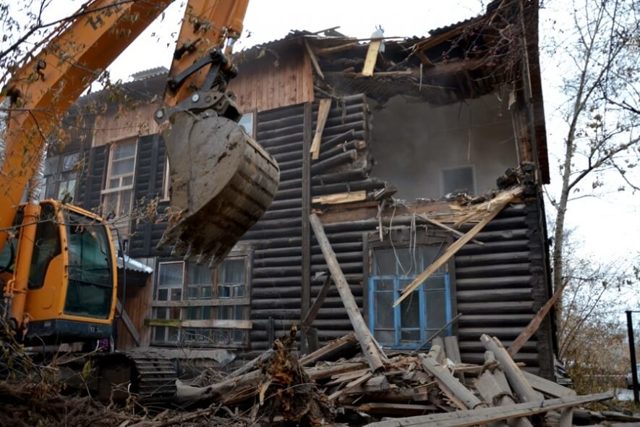
Residents must be notified in advance of demolition
Owners of privatized apartments in the building have the right to receive in return equivalent comfortable housing or monetary compensation, the amount of which is equal to the market value of their housing. Equality of housing in this case assumes:
- appropriate size of living space;
- the same number of rooms;
- location in the same area as the house to be demolished
The owner may also demand reimbursement of costs incurred due to relocation, hiring temporary housing, etc. However, when selecting equivalent housing, the citizen is not given the right to choose its location, although this factor can be very important and tip the scales in favor of receiving monetary compensation.
Monetary compensation may be offered to a citizen if housing replacement options are not suitable for him. The compensation is targeted and is paid by bank transfer.
Targeted purpose means that the payment can only be spent on purchasing housing. However, if a citizen already has another living space, then the payment can be spent on other purposes, but with the permission of the local administration.
Sequence of actions during relocation
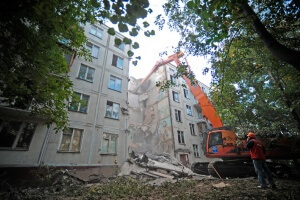
When a house is demolished, residents receive housing of equal value
Owners of apartments in a building subject to demolition have the right to learn about the upcoming eviction one year in advance. Relocation before this period is illegal.
The exception is when the house is about to collapse. In this case, residents are provided with temporary housing belonging to the flexible fund as soon as possible.
The one-year period allows local authorities to select and offer residents of a dilapidated building several options for a new home. Residents can leave emergency housing and move to a new one that suits them before the end of the one-year period.
New housing is transferred into ownership free of charge, and a purchase and sale or exchange agreement is concluded. The conclusion of the agreement obliges residents to leave their old emergency apartment within a month.
Based on the agreement, further registration of the owner’s rights in the State Register is carried out. It is unacceptable to provide housing under a social tenancy agreement in exchange for a privatized apartment.
What to do if the apartment is not privatized?
This question arises for all residents living in a dilapidated building under a social tenancy agreement. After all, residents who have privately owned apartments have undeniable advantages over tenants:
- the opportunity to receive a free apartment in return of the same area and within the same locality;
- receiving a new apartment entails the transfer of property rights to it, that is, the new housing will also be the private property of the citizen who received it;
- admissibility of receiving monetary compensation instead of new living space

Modern houses are being built on the site of old Khrushchev-era buildings.
It should be said that before the demolition of the house, you can have time to privatize the housing, because recognizing it as unsafe is not an obstacle to privatization.
The final deadline for free privatization has been extended by the government for another year and will end on March 31, 2017, so citizens who have not privatized their apartments should hurry up so as not to completely miss this opportunity.
Art. 86 of the Housing Code of the Russian Federation states that if there is a non-privatized apartment in a building subject to demolition, the social tenancy agreement with the tenant is terminated. Such a citizen is provided with a new comfortable home, for which a similar agreement is also concluded.
There are several controversial legal issues here. If a citizen living under a social tenancy agreement was registered to improve his living conditions (that is, if the area of his apartment did not meet the standard for providing living space per person), then in the event of relocation, what size housing should the authorities offer him?
The opinions of officials on this issue vary significantly: some believe that new housing should be selected taking into account the standard of living space per person, others believe that housing should be provided that is the same size as previously occupied, but at the same time the right to be on the housing register and retain a place in the queue.
This is not the only controversial issue in the issue of relocation from emergency housing. The interpretation of legislative norms lies entirely on the shoulders of local authorities.
In case of refusal, the residents will be moved to new apartments provided to them; this issue, at the initiative of local authorities, will be resolved in court.
Only a court decision gives the right to forcibly evict tenants to a place designated by the court.
Emergency housing: compensation or relocation? Consultation video:
Noticed a mistake? Select it and press Ctrl+Enter to let us know.
- Share
- In contact with
- Class
- Telegram
Compensation for the demolition of a house in 2023: what is better: ransom or compensation, how to get it
In recent years, the government has been actively engaged in renovating residential areas - dilapidated buildings are being destroyed, and new modern houses are being built everywhere.
In this case, the problem inevitably arises of ensuring the rights established at the legislative level of both the owners of housing subject to demolition and city authorities.
In the article we will tell you what compensation is paid for the demolition of a house in 2023, and we will consider the procedure for receiving it.
To resolve controversial issues, federal legislation was undertaken to regulate the procedure for confiscation of residential premises from owners.
You need to familiarize yourself with the laws in time, otherwise you can lose both your home and your money.
It may happen that there is no official decision on demolition; the developer simply found a plot of land that was owned by someone attractive.
Phone numbers for free consultation on legal issues
Procedure for repossessing a house before demolition
The procedure for repossessing a house is strictly regulated and consists of the following stages:
Reasons for demolition:
- emergency condition,
- the need to use the site under the house due to the lack of other options for the construction of objects of municipal and state importance (these are gas pipelines, transport routes, energy systems, structures for defense and security purposes, etc.).
- Involvement of an independent organization to assess the condition of the building and issue an official conclusion.
- Gathering of an interdepartmental commission to approve its decision on repair or demolition of the house.
- The government department issues a decree to demolish the building.
- The decision to confiscate a structure is subject to state registration.
- Owners of seized buildings receive appropriate notification (no later than 12 months before the expected date of demolition).
- The department and the home owner sign an agreement to buy the house, or a court hearing is scheduled if the owner does not agree with the assessed value of his home.
- The owner is paid the redemption price or is provided with equivalent residential premises in replacement of the seized one. Residents of the building move into temporary housing and begin to look for a permanent place to live.
- The termination of the right to own residential premises is registered.
- Demolition is in progress.
Which is better: buying the house or compensation for demolition in the form of new housing?
When a house is recognized as subject to repossession, its owner is faced with the question: what is more profitable to ask from the developer or the government body involved in the purchase of houses for state needs.
If we are talking about the purchase of land and a house by a private developer, then you can ask for anything at your own discretion, since no one obliges the homeowner to give up his space for the sake of the interests of the developer.
You can demand compensation, reimbursement of moving costs, a new apartment or an equivalent plot and house.
If the state is interested in the land and the building, then after receiving and registering all the documentation authorizing the legal seizure and demolition of the house, it will be seized one way or another. All that remains is to resolve the issue of the redemption price or compensation, by agreement of the parties or by going to court.
- Providing equivalent housing is in most cases the most profitable option due to several factors:
- apartments and houses are steadily becoming more expensive, and the amount of compensation every month will be enough for fewer and fewer residential meters;
- cases of fraud in the purchase and sale of housing have become more frequent;
- It is unknown how long it will take to find housing, and renting temporary housing is expensive and drains resources.
- Compensation is paid based on the assessment conclusion of a special commission, and sometimes the funds are not enough for equivalent housing, since improvements (repairs) made to the house are not taken into account.
The redemption price consists of the following indicators:
- market value of the building,
- owner losses incurred due to demolition of housing and relocation (costs of fees, moving, rental of temporary housing, purchase of a new house or apartment).
How a house is evaluated: evaluation criteria
In the case when the plot of land on which the house stands, on the date of the official decision to seize the building, was formed and registered by the Cadastral Chamber, the owners of the land can demand the redemption value not only for the structure, but also for the plot. Moreover, the price of land does not have any impact on the payment of the redemption value for the seized residential premises.
Compensation may be provided in the form of another living space equivalent to the old house. This is possible only with the consent of the owner, because his interests are put above all else - his housing is forcibly confiscated for the needs of the state or municipality.
The redemption price of the building should not exceed the market value of the house, taking into account the costs associated with changing the place of residence:
- moving expenses,
- rental of temporary residential premises,
- purchasing an apartment or house for further permanent residence.
When assessing a house, compensation equal to the market value is calculated taking into account:
- the degree of wear and tear of the cottage itself and other buildings on the site,
- number of outbuildings and perennial plantings,
- distance from the center of the village,
- level of infrastructure development,
- availability of amenities and connection to central communications.
It is worth mentioning that if the owner of a destroyed house chose new housing instead of monetary compensation, and he was provided with a house or apartment, which at market value turned out to be lower than the seized residential premises, the owner is paid the difference in price between them.
Demolition of a house during road construction, gas pipeline construction
Often, private cottages are considered subject to seizure and demolition due to the fact that they are built on areas through which a gas pipeline or road is planned to be laid. Perhaps there was even a need to build an object of national importance on the land in question.
Unlike the situation with a private developer, the owner of the house will be forcibly deprived of housing, and he cannot refuse to move. Therefore, he is entitled to monetary compensation or equivalent housing, at the discretion of the owner, which would satisfy his interests and compensate for the inconvenience.
It happens that the owner and his family have difficulties moving to a new place, the contractor sues, and the decision is made in favor of the authorities. Then the demolition of the building is considered a resolved issue, and its residents can no longer live there.
In any case, the law prohibits starting demolition immediately after notifying the owners. First, they must review the documents, request compensation, receive it, register the termination of ownership and move.
This should be given at least a year.
Whenever new permanent housing is found, authorities must provide citizens with temporary housing immediately after eviction.
Moreover, the apartment or house must be connected to communications and meet sanitary and space standards. The safest thing to do is not to move until you are sued. In this case, you will be sure that everything is happening according to the law.
A bill on the payment of compensation for the seizure and demolition of country houses in the area where gas pipelines were laid was introduced to the State Duma.
It is expected that a clear procedure will be established that would guarantee adequate compensation for damage to owners of houses who built them legally.
Reimbursement for moving expenses
The redemption price of the property seized for the needs of the authorities must include not only the market value of similar comfortable housing, but also the costs incurred by the family in collecting and moving to temporary and then permanent housing.
It is worth noting that expenses that were incurred after the owners were notified of the demolition of the house, and which largely lead to an increase in the cost of living space (and are also not so necessary for decent living of family members), will not be reimbursed. We are talking about repairs, restoration, purchasing equipment, etc. In fact, the compensation will be minimal, not taking into account the cost of the improvements made.
How to apply for compensation due
When you find out that your house is to be demolished, you need to take the following measures:
- Privatize the apartment if it has not yet been privatized. The law allows this to be done even with the planned demolition of a building.
- If we are talking about a private house, you need to hurry to register ownership of the land plot, since the legislation better protects the owners, not the tenants, and the former are entitled to greater compensation, unlike the latter.
- Hire several independent appraisers and obtain opinions on the value of the demolished housing. This will allow you to justify the amount of compensation you are requesting in court.
- Do not sign an agreement to waive ownership of the home until compensation has been paid.
- Sign an agreement on the amount of compensation that suits you, or that you are entitled to after the court decision comes into force.
Ways to receive compensation
Compensation for a seized house can be provided in the form of:
- cash payment equal to the market value of housing and moving costs,
- new housing equal in market value to the repossessed house,
- housing that is smaller in area or located in a less prosperous area or far from the center of the settlement, with an additional payment equal to the difference between the prices of seized and new residential premises.
In the first case, the owner of a destroyed house receives an amount that compensates for the market value of his home and the costs associated with moving to a new place. It happens that this money is not enough to buy a new home because the house being demolished was small or dilapidated. Then the home owners are left homeless.
In the second case, the process of searching for equivalent housing may take years, because it is difficult to find exactly the same housing in the same area and near the same structures, hospitals, schools. For many months, or even years, you will have to live in temporary housing.
The third case is ideal for those for whom the location of the structure is not so important. By dealing directly with the contractor, you can be sure that fraud with money and apartments is excluded. Plus, the family will receive an additional payment if the new housing turns out to be cheaper than the repossessed one - the amount can be spent on repairs and other improvements.
The option of providing new housing, rather than money, is best suited for apartment tenants, since they should be allocated free housing within the area limits for each family member. But the owners of residential premises will not be able to cut “extra” meters.
Terms of payment of compensation
If the owner of the seized house does not agree with the estimated value of his home established by government agencies, he has the right to substantiate his claims in court. Once the parties have agreed on the amount of compensation, the case moves forward.
Payments must be made until the termination of his rights to the residential premises, which are being prepared for demolition.
Reasons for refusal to pay compensation
If the demolition of houses is required to implement the plans of the state or municipality, and the building is declared uninhabitable, then compensation for it is not due.
According to the Housing Code of the Russian Federation, the norms for the provision of housing in return for seized housing (taken under a social tenancy agreement) are 18 m2 per person, but you must be registered in the house being demolished, or you will have to prove the fact of residence in the building.
Monetary compensation is not due to those who received an equivalent apartment or house in exchange for seized housing. Residents of the house who are not registered in it are entitled to only monetary compensation; new housing cannot be provided.
Legislative acts on the topic
It is recommended to study the documents in advance:
| Art. 32 Residential Complex of the Russian Federation | On the provision of equivalent housing when demolishing a house for municipal or state needs |
| clause 1 art. 17 of the Constitution of the Russian Federation | inviolability of the rights and freedoms (including property) of other persons, while respecting one’s own rights and freedoms |
| Art. 35 of the Constitution of the Russian Federation | inadmissibility of arbitrary seizure of property except by court decision |
| Art. 239 Civil Code of the Russian Federation | demands compensation for the seizure of real estate for municipal needs |
| Art. 281 Civil Code of the Russian Federation | procedure for determining the proportionate redemption value |
| Art. 493 Civil Code of the Russian Federation | compensation for losses to residents of a house “under demolition”. |
| Art. 32 Residential Complex of the Russian Federation | basic provisions on the provision of compensation for the seizure of housing for municipal needs |
| Art. 50 Residential Complex of the Russian Federation | standards for accounting and provision of living space during resettlement |
| Art. 36-38 Housing Code of the Russian Federation and 290 Civil Code of the Russian Federation | inclusion in the purchase price of shared space and privatized local area |
| Art. 137-139 Housing Code of the Russian Federation | determines the procedure for the seizure of private houses |
What and who is entitled to when demolishing a house?
Now the issue of resettlement is regulated by Art. 32 of the Housing Code of the Russian Federation, which clearly regulates what and who is entitled to during the demolition of a house.
1. Owners of residential premises (rooms in communal apartments, apartments)
If the land on which their apartment building stands has been decided to be confiscated for state or municipal needs, then they receive a written notification one year before the confiscation. Confiscation of land and residential premises occurs through redemption.
What is included in the purchase price?
It includes the market value of the residential premises. In the event of a dispute, the value of residential premises is determined in accordance with the legislation regulating valuation activities. An examination may be ordered.
Also, the redemption price includes all losses that the owner of the residential premises suffers (will suffer in the future) as a result of its seizure. Possible losses for the owner of a residential premises include, in particular:
1) expenses that he incurs in connection with a change in place of residence. For example, the new place of residence is located far from the place of work, and therefore the cost of travel to the place of work has increased;
2) expenses for paying for the use of other residential premises before acquiring ownership of other housing. For example, the owner of a seized residential property is forced to rent an apartment. Naturally, reasonable expenses must be taken into account, and it is possible to establish a reasonable period during which another residential property must be purchased;
3) expenses associated with moving, for example, payment for transport services, services for loading and unloading things, etc.;
4) expenses incurred by the owner of the seized residential premises in connection with the search for another residential premises for living, including for acquiring it into ownership, for example, payment for real estate services.
By the way, it is also possible to provide another residential premises in exchange for the seized one, but only by agreement. Moreover, its cost is included in the redemption price.
2. Owners of a private house with a plot of land
You set the price for your plot and house yourself, taking into account all the circumstances - proximity to communications, distance from the center, square meters. This amount can be determined with the help of a real estate and land appraiser. It is important to remember that the number of registered people in a given residential premises does not in any way affect the increase in its value.
3. Tenants of municipal housing (live in an apartment (house) under a social tenancy agreement, including in a wooden house for two owners)
Here only the provision of residential premises is possible. Moreover, the legislation clearly outlines its characteristics. If citizens are resettled under Art.
86-88 Housing Code of the Russian Federation (demolition of a house due to its recognition as unfit for habitation, major repairs or reconstruction of the house), then another residential premises must be well-equipped in relation to a given locality, equivalent in total area to the previously occupied premises, and be located within the city boundaries .
In other words, if you lived on 20 square meters. meters, you have seven people registered, you will also receive 20 meters, regardless of your registered ones!
Also, if you occupied an apartment or at least two rooms, then you have the right to receive an apartment or living space consisting of the same number of rooms in a communal apartment.
It is important to remember that if your house is demolished, the premises of the house are not provided in connection with the improvement of living conditions. Thanks to this, you retain the right to be registered as those in need of residential premises.
Expert commentary
Sergey SHARIKOV, director of the law firm "Baghira"
— The Housing Code of the Russian Federation provides for the grounds for the provision of residential premises or the purchase of residential premises in connection with the demolition of a house: according to Article 86 of the Housing Code of the Russian Federation, the procedure for providing residential premises under a social tenancy agreement in connection with the demolition of a house and under Art. 32 of the Housing Code of the Russian Federation Ensuring the housing rights of the owner of a residential premises during the seizure of a land plot for state or municipal needs.
In the first case, citizens are provided with other comfortable housing, in area no less than what was previously, located in a given locality under a social rental agreement.
State authorities or local governments can provide residential premises of a larger area, in accordance with the provision for each family member (Article 57 of the Housing Code of the Russian Federation). However, there is no obligation to provide living quarters with a larger area, because
eviction from residential premises is carried out in connection with the demolition of the house, and not in connection with the improvement of living conditions. In this case, citizens retain the right to be registered as those in need of residential premises.
In the second case, citizens living in residential premises under social tenancy agreements are provided with residential premises, just as in the first case. From citizens who own residential premises, these residential premises are confiscated by redemption, or, by agreement of the parties, the owner may be provided with another housing with its value offset against the redemption price.
Prepared by Irina VASYUKOVA
Editorial office: 675000, Blagoveshchensk, st. B. Khmelnitsky, 20
|







